- Getting around Lijiang. Dont stay in the Old Towns more than 2 days, there is nothing to do. KRISS Oct 9, 2013 05:46
- 2013 Beijing Temple Fair BENNYLAU Feb 26, 2013 03:29
- Malaysian traveling from KUL - LAX vis Shanghai PVG ZATI_DY Jan 3, 2013 20:15
Shopping at the Yangshuo Farmer's Market
- Views: 11453
- |Vote: 1 1
- |Add to Favorites
- |Recommend to Friends
Hunting for Chinese Spices
The Yangshuo market is situated at a major three way intersection in the downtown area, at a distance from the westernized Xijie and its shiny souvenirs. On one side of the intersection is a traditional restaurant with a wall-covering picture of several fluffy dogs that look like chow-chows. These cute, adorable dogs are advertising a delicious dogmeat stew restaurant. In Asian medicine, dog meat is considered a high-calorie, warming food. It’s said that high-calorie foods “kai huo” (open the fire) or raise your body temperature and stimulate your system. The low-calorie foods (like cat or chrysanthemum tea) lower your body temperature and are traditional summer foods. I don’t know if cat meat is eaten still in China, but dog meat is a popular Fall and Winter food in some parts of China, especially for older people who have trouble staying warm. I have never tried it though because I have a pet dog at home, and he would not trust me anymore if he found out I ate dog meat.
Perpendicular to the dog-meat restaurant and sidewalk Guilin rice noodle restaurants, are the sidewalk vendors marking the entrance to the market. There are carts here full of fresh oranges and kumquats from the citrus orchards that blanket the countryside. I feel happy looking all all the oranges, so juicy and young, paraded alongside mangos, longans, and other fruits imported from neighbouring Vietnam. The oranges are just begging to be peeled, segmented, and popped between one’s teeth.
In order to see the market, you need to follow the orange carts and then turn left into a warehouse. The warehouse is the typical kind of building that houses farmer’s markets in many Asian cities. I was looking forward to purchasing some local spices and cooking ingredients to take back home with me. One of the best parts about visiting China is trying all the different kinds of foods. Some of the best souvenirs you can bring home are spices and flavourings so you can try making your own Chinese foods back home.
Sleuthing the Local Taste Buds
The previous day was Valentine’s Day, and I was hoping my partner and I could try something interesting for dinner, such as bamboo rat, a local delicacy. However, we didn’t find a place that served bamboo rat and we settled for a timid dinner of vegetables instead. So the next day I went to the market to look for some interesting items that would give me clues to the local palate and provide some inspiration for my future cooking experiments.
For about ten years now, I have been on a Crusade for the Holy Grail of all soups, a perfect bowl of hot and sour soup. Though I am getting closer to my Holy Grail (filled with hot and sour soup), there is still, alas, something missing from my hot and sour soups. After trying the potions at many restaurants and studying many recipes, I’ve narrowed the missing ingredient to black rice vinegar, white rice vinegar or red rice vinegar…
Even though it sounds easy to reverse engineer recipes from foods you had in restaurants, it sometimes takes a while to coax the secrets from the food. First of all, I charm or cajole the chef to share some of his secrets with me, but in the case of hot and sour soup, my favourite chef stopped at some “complicated seasoning mixes” after telling me that the most important thing was to cook a chicken stock for the whole day first, then shred the chicken and put the pieces in the soup.
So rice vinegars were on my shopping list, as well as star anise (ba jiao) for veggie stir fries, Szechuan peppercorns (hua jiao) and ma-la lard mix for hot pots, Guilin noodles, hot peppers, and Uygur lamb spices. I like to use the Uygur spice mixes as a seasoning for fried rice and meat kebabs. The hot peppers I sought were the short, stubby type that crumble like dried leaves in your hand and can be sprinkled over vegetables. Even when you have a simple dish of fried vegetables like pea sprouts, the red flakes of peppers lend colour and pizazz to an already tasty dish.
The Fish Heads' Fight for Life
Upon entering the market, the area immediately before me was the butcher shop. Laid out on long wooden planks were cuts of large river fish on ice, and inside plastic red basins, a multitude of severed fish heads gasped ferociously for air. Gasp, gasp, gasp. I felt my heart coming up my throat as I watched the decapitated fish heads gasping for breath, as their little hearts beat in the fillets of their bodies that were halved and chopped next to them. It was one of those scenes that keep your eyes glued to it even though you don’t really want to keep watching. Oh, the horror!! I finally tore my eyes away from that scene, and went to check out the rest of the market.
Maybe I am too soft, but it bothered me to see the aquatic animals tied in nylon bags sitting in basins for sale. Especially the soft shelled turtles with their leathery backs, waving their snouts in the air, wondering how they had come from swimming in the river to this strange place that smelled like blood and human beings.
Against one of the walls near the entrance, there was a lot of home made tofu, and fish balls formed by hand. I like the hand made ones because you can see the finger indentations of the person who made them, whether they had small hands or big hands. Further down the aisle, in the middle of the market was the live fowl area. There were live pigeons, chickens, geese in cages. I saw people walk in with wicker baskets. Once they had bought some chickens for dinner, they would stuff them in the basket and then tie the basket to their motorcycle or bike. I found it mildly amusing to see locals wearing business suits walking down the street carrying baskers with feathers sticking out, all the while, the basket making clucking sounds.
The Simple Life
One of the reasons I propose that people shop more at farmer’s markets is because you can actually see what the animals look like alive. It makes you realize that we’re all in a web of life together, that some animals died so that you could eat them for lunch and dinner. When I was bicycling around the countryside outside Yangshuo, there were chickens everywhere, running around the rice paddies, and seeming to enjoy themselves. I felt that over here, the animals were actually healthier, and therefore better for your health than the chickens bred in large factories. I can handle the markets, because they are from real life, while mass supermarkets seem divorced from reality and lead people to forget where their food is coming from.
Towards the back of the market, I saw half a dog hanging on a hook along with a singed rabbit. Some Westerners can’t handle seeing that, but then I realized it’s just part of life here. The market gave me a really good feeling for the local villagers, how they make a living, for instance, by harvesting and pickling vegetables, and selling them at the market. This whole mosaic of human beings, each going about their life, selling some food staples, was to me colourful and simple, but also quite profound. Even when people do simple things but with concentration, its profound. This was the China I wanted to see, the individual people who were struggling to make a living, and maybe even working on big dreams, on building a future.
After spending about an hour there, I left with some valuable booty in my shopping bag. My most prized possessions were two big bags of hot red chili peppers. I am happy to say they were fantastic over almost everything I cooked in the next few months. There were some other things I bought just out of curiosity, like the big chunk of mountain bee honey. An old guy outside the market was displaying on the sidewalk a big ball of mountain honeybee honey that he dug up from one of the karst hills that puncture the Yanghsuo skyline.
I was a little skeptical at first about the veracity of his claim, but bought a block of this crystallized honey anyways. He said that it made a really nice tea when mixed with hot water. Later, when I brought it back home, I melted it in a double boiler and it turned into the most fragrant, osmanthus-infused honey that I ever tasted or smelled in my life. Then, I knew that he had told the truth about finding the beehive on a mountain. It smelled too divine to have come from anywhere else.
Finally, there were some really interesting herbal remedies that I passed up, most of all, bags of dessicated big black ants that might look nice sprinkled over white rice. Well. It's not good to be too greedy all at once. I'll save those delicacies for next time I come to China, along with the do-it-yourself home kits for snake, seahorse, and scorpion wine. They looked really interesting, but I still need to work up my courage before imbibing something with so many alien creatures inside.



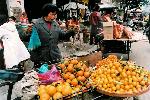
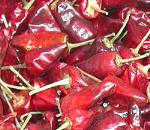
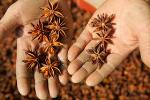

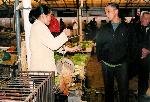
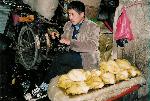
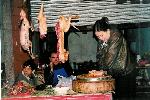
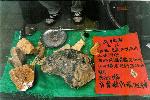
 Copyright © 1998-2026 All rights reserved.
Copyright © 1998-2026 All rights reserved.
1.
Feb 28, 2008 02:55 Reply
LEMONCACTUS said:
A great insight into a Chinese market, Chynagyrl. I love buying my herbs, spices and dried ingredients from these kinds of markets... but not too keen on the meat sections...
2.
Jun 16, 2007 00:05 Reply
WINDENERGY said:
A wise conclusion, CHYNAGIRL. I am shocked everytime I go to the marketplace. Just getting used to the baked chicken and ducks with their heads still attached! Probably the strangest food I've seen for sale are the rice-paddy eels. Slimy and living in a water trough, I could not imagine buying some to take home and cook. I did have eel served to me once and tried a little. Not really what I would called gourmet cuisine!
3.
Jun 15, 2007 23:30 Reply
DANCER50 said:
Great article. Interesting and fun to read.